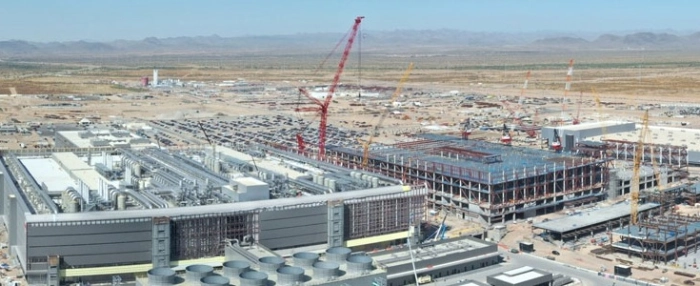
TSMC increases its investment in US production to $65bn
Taiwan's contract chipmaker TSMC will build a new fab in Arizona in what is claimed to be the largest direct project investment by a foreign company ever.
The US Commerce Department has just confirmed it will award a USD 6.6 billion subsidy and USD 5 billion in low-cost government loans to TSMC to boost production at its Phoenix, Arizona facilities.
In response, TSMC agreed to increase its planned investment in US-based production by USD 25 billion to USD 65 billion – and to add a third Arizona fab by 2030. It also plans to apply for US Treasury Department Investment Tax Credits of up to 25% of the qualified capital expenditure at TSMC Arizona.
The government said TSMC's Arizona plan represents the biggest all-time new project investment by an overseas entity.
TSMC had previously pledged USD 40 billion of investment in US production. Its first Arizona fab will produce 4 nanometer FinFET process technologies from next year, while its second fab will produce 2 and 3 nanometer process technologies by 2028. The proposed third fab will produce 2 nanometer chips by the end of the decade.
The funding is, of course, the latest action to result from the 2022 Chips and Science Act, which aims to boost domestic semiconductor output with USD 52.7 billion in research and manufacturing subsidies. The TSMC funding package is the second-largest announced after the USD 8.5 billion in grants and USD 11 billion in loans awarded to Intel last month.
In total, TSMC Arizona’s three fabs are expected to create around 6,000 direct jobs, and many more indirect ones. Indeed, according to an analysis by the Greater Phoenix Economic Council, the three fabs could create more than 20,000 accumulated unique construction jobs, and tens of thousands of supplier and consumer roles.
There's also an environmental component to the TSMC project. It says its Arizona fabs are designed with sustainability in mind and are set to achieve a 90% water recycling rate. The eventual plan is for “near zero liquid discharge”, bringing nearly every drop of water back into the facility.
The TSMC move should benefit the US supply chain that depends so critically on the Taiwanese firm's production capacity. These include Apple, Nvidia, Advanced Micro Devices Qualcomm, and many more.
"These are the chips that underpin all artificial intelligence, and they are the chips that are necessary components for the technologies that we need to underpin our economy, but frankly, a 21st century military and national security apparatus," Commerce Secretary Gina Raimondo said in a statement.


